Posts Tagged ‘Günter Grass’
PEN Journey 41: Berlin—Writing in a World Without Peace
PEN International celebrates its Centenary in 2021. I’ve been active in PEN for more than 30 years in various positions and now as an International Vice President Emeritus. With memories stirring and file drawers of documents and correspondence bulging, I am a bit of a walking archive and have been asked by PEN International to write down memories. I hope this personal PEN journey will be of interest.
I first visited Berlin in the fall of 1990 just after Germany reunited. I was living in London and took my sons, ages 10 and 12, to witness history in the making. I returned on a number of occasions, researching scenes for a book, attending meetings, and visiting German PEN in preparation for PEN’s 2006 Congress. Each time Berlin’s face was altered as the municipalities east and west moved to become one city again.
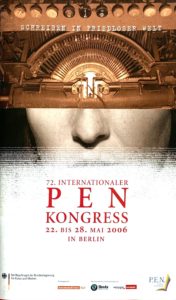
PEN International’s 72nd World Congress, Berlin, 2006
At the time of PEN’s Congress in May 2006, Berlin was bedecked with water pipes above ground—pink, green, blue, red—before the city buried its plumbing and infrastructure beneath the streets. Portions of the city had the appearance of an amusement park; there were also sections of the Berlin Wall with its colorful graffiti still standing, more as art exhibit than stark barrier to freedom.
“Welcome to a United Berlin” the German PEN President headlined his letter to the 450 delegates and participants for PEN’s 72nd World Congress. The Congress theme “Writing in a World Without Peace” was challenged by the reunification of Berlin and Germany, a historic event which bode well for the prospects of peace and which stood in contrast to the history that had come before. Yet the globe was still in conflict in the Middle East, in Asia and in Latin America where writers were under threat.
“There are countries such as Iran, Turkey or Cuba, where authors are jailed because of their books,” noted International PEN President Jiří Gruša. Resolutions at the Congress addressed the situations for writers imprisoned or killed in China, Cuba, Iran, Mexico, Russia/Chechnya, Sri Lanka, Uzbekistan, Vietnam, and other countries.
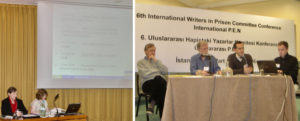
Left: Writers in Prison Committee (WiPC) meeting at Berlin Congress. Karin Clark (Chair WiPC) and Sara Whyatt (WiPC Program Director). Right: WiPC Conference in Istanbul: Eugene Schoulgin (Norwegian PEN/PEN Board), Jens Lohman (Danish PEN), Jonathan Heawood (English PEN), Notetaker
Two months before in March, over 60 writers from 27 PEN centers in 23 countries had gathered for International PEN’s Writers in Prison Committee conference in Istanbul where the WiPC planned a campaign against insult and criminal defamation laws under which writers and journalists were imprisoned worldwide. The conference also addressed the recent uproar over the Danish cartoons, impunity and the role of internet service providers offering information on writers, especially in China. A working group formed to support the Russian PEN Center which was under pressure from the Russian government.
Berlin, however, was sparkling and filled with the energy of reunification. “Today, this city—once separated by a Wall most drastically manifesting the division of Germany and Europe—has not only been re-established as the capital of Germany, but has simultaneously turned into a thriving meeting-place between East and West and North and South,” welcomed Johano Strasser, German PEN President. “Here in Berlin, history in all its facets—from the great achievements of German artists, philosophers and scientists to the crimes of the Nazis—has left its mark on the urban landscape.”
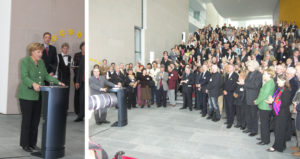
Left: German Chancellor Angela Merkel addressing PEN members at 72nd PEN Congress, 2006; Right: PEN International President Jiří Gruša speaking to PEN delegates and members at the Federal Chancellery; front row: German PEN President Johano Strasser, Chancellor Angela Merkel and PEN International Secretary Joanne Leedom-Ackerman. [Photo credit: Tran Vu]
The keynote address by Nobel laureate Günter Grass challenged the conflicts around the globe and the countries engaged in them. “There has always been war. And even peace agreements, intentionally or unintentionally, contained the germs of future wars, whether the treaty was concluded in Münster in Westphalia, or in Versailles,” he said.
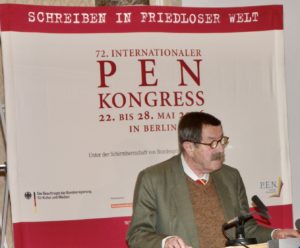
Nobel laureate Günter Grass addressing Opening Ceremony of PEN International’s 72nd World Congress in Berlin, 2006 [Photo credit: Tran Vu]
As I sat on the dais on the edge of the stage listening to this renowned German writer, I leaned over to Jiří and said, If there is a standing ovation, I can’t stand. I was concerned. Grass could say and think whatever he wanted, but PEN was a non-political organization. Whatever my views of my country’s foreign policy, I was an American; I was also the mother of a son in uniform. Jiří leaned back to me and said in effect: Don’t worry, I won’t stand either. The speech ended with applause but no ovation, and then everyone got up and went to the next event.
It wasn’t my role to argue with Günter Grass even had the occasion allowed. But it was important that PEN assure the open space for debate existed which it did later in the Congress workshops and programs. PEN was filled with a multitude of points of view among its members; it did not have a litmus test of politics, only a commitment to the free expression of ideas. It offered a wide tent where views could be debated and challenged. Dogmatic political certainties often fell on their own in the alchemy of literature and imagination.
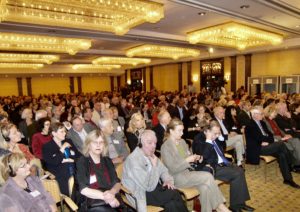
PEN members and delegates from around the world at Opening Ceremony of 2006 PEN Congress [Photo credit: Tran Vu]
Programs at the Congress also featured Nobel laureate and PEN International Vice President Nadine Gordimer and writers from around the world, including former International PEN Presidents Ronald Harwood, and György Konrád, Bei Dao, A.L. Kennedy, Margriet de Moor, Péter Nádas, Per Olov Enquist, Mahmoud Darwish, Duo Duo, Jean Rouaud, Johano Strasser, Veronique Tadio, Patrice Nganang and others. These writers participated in the literary events, including an evening of African literature and one of writers of German literature who had immigrated from abroad to Germany or had non-German cultural backgrounds. Afternoon literary sessions included prominent PEN writers introducing authors of their choice, an afternoon of essays and discussions on the theme Writing in a World without Peace and a lyric poetry afternoon.
PEN’s 85th anniversary coincided with the 60th anniversary of the United Nations. Both organizations had been founded after a World War out of an idealism that arose from desperate times with the hope that the future could be better than what had just transpired. “Both organizations were founded on a belief in dialogue and an exchange of ideas across national borders,” I noted in my address to the Assembly of Delegates. “When U.N. members were writing the Universal Declaration of Human Rights, the framers consulted, among other documents, PEN’s Charter.”
PEN also had a history with the city of Berlin, where PEN members had gathered in 1926 for the first international meeting of importance held in Berlin after World War I. At that Berlin Congress tensions had arisen among old and young writers, writers from the west and the east, and debate had flared about the political versus the nonpolitical nature of PEN. The debate that stirred in Berlin in part led to the framing of PEN’s Charter the following year.
Since those early days, PEN had grown in size beyond what the founding writers might ever have imagined. After the 2006 Berlin Congress, with the addition of centers in Jamaica, Uruguay, and Pretoria, South Africa, PEN had 144 centers in 101 countries in almost every time zone. The PEN world didn’t sleep. Someone, somewhere was always awake doing something. Through its centers PEN International participated in at least a dozen conferences around the world each year, including meetings of its standing committees. PEN thought globally but worked locally.
Berlin—with its own alterations and progress—proved a fitting location for the presentation of International PEN’s new Three-Year Plan. For the past decade, since the 75th Anniversary at the Congress in Guadalajara, PEN International had been in an organizational reformation. It now had a governing structure with a global Board that participated in decision-making; it had revised its Constitution and Rules and Regulations; it had developed a budget, increased its funding, and recently moved its offices into Central London to a larger space with cheaper pro rata rent and an elevator, which had meaning for anyone who had climbed the steep four (or five?) flights to PEN’s old offices. The staff size had also increased, and PEN had hired its first Executive Director, Caroline McCormick Whitaker, former Development Director from the British National History Museum.

International PEN Board meeting preceding 72nd PEN Congress in Berlin, May 2006. L to R: Eugene Schoulgin (Norwegian PEN), Judith Rodriguez (Melbourne PEN), Kata Kulakova (Chair Translation & Linguistic Rights Committee), Sylvestre Clancier (French PEN), Sibila Petlevski (Croatian PEN), Chip Rolley (Chair Search Committee), Karen Efford (Program Officer), Caroline McCormick Whitaker (Executive Director), Joanne Leedom-Ackerman (PEN International Secretary), Jiří Gruša (International PEN President), Peter Firkin (standing—Centers Coordinator), Eric Lax (PEN USA West), Jane Spender (Programs Director), Judith Buckrich (Women Writers Committee Chair)
Because British charitable tax law had changed, the opportunity had also arisen to unite International PEN and the International PEN Foundation into one charitable organization: International PEN, Ltd, a step that would provide the legal framework and protection for the organization and PEN’s name, would limit personal financial liability of the Board and attract a wider funding base. At the Berlin Congress, resolutions and approval were endorsed for this step which would be finalized the following year at the 2007 Congress in Dakar.
Caroline Whitaker took the Assembly of Delegates through the Three-Year Plan which had been developed after widespread consultation with PEN centers and the Board. She acknowledged that PEN couldn’t do everything that everyone wanted right away, that it was necessary to focus resources even as PEN developed more resources.
The Plan, which had grown out of all the discussions and preceding plans, concentrated on PEN’s three missions: to promote literature, to protect freedom of expression and to build a community of writers. “International PEN will work regionally to connect the activity of its many Centers around the globe on these issues,” Caroline told the delegates.

All PEN’s Standing Committees met at Berlin Congress—Writers in Prison Committee, Translation and Linguistic Rights Committee, Women Writers Committee and Peace Committee [Photo credit: Tran Vu]
In helping to develop PEN’s centers, the Three-Year Plan recommended International PEN focus on one region at a time, beginning with Africa where the 2007 PEN Congress would be held. International PEN would assist in programming and fundraising for development of PEN’s African Centers. The next regional focus would be Latin America, where PEN’s 2008 Congress was to be held. This rolling focus would allow the limited international staff to plan strategically. Regular daily work would still continue for the needs of centers in all regions.

PEN members met in workshops at 72nd Berlin Congress. Topics: PEN in the World—Global Issues; Education; the Strategic Plan; Centers; Networks and Partners; Asia and Central Asia; Middle East; Africa; Europe and Americas [Photo credit: Tran Vu]
As International PEN’s work had taken me across the globe that year, I’d come to see that PEN and its members formed a kind of intricate net which helped hold civil society together, the kind of sturdy net used on hills to prevent landslides. In a way that is what PEN members did around the world. They helped prevent literary culture and languages and freedom of expression from slipping away by both their active programming and their defensive actions
At the 1926 PEN Congress in Berlin International PEN’s President John Galsworthy and PEN’s founder Catherine Amy Dawson Scott had their voices recorded and preserved in a project of the German state. Galsworthy read a page from his Forsyte Saga. According to Dawson Scott’s journal, she recorded the following: “Even as individuals become families and families become communities and communities become nations, so eventually must the nations draw together in peace.”
It was a worthy, if not yet realized goal, but at least in PEN we had a global family.

Mayor’s reception for PEN members and participants at 72nd World Congress in Berlin, May 2006 [Photo Credit: Tran Vu]
Elections at 2006 Congress:
International PEN President: Jiří Gruša was re-elected for further 3-year term.
International PEN Board: Cecilia Balcazar (Colombian Center) and Eugene Schoulgin (Norwegian PEN re-elected to the Board)
Vice Presidents: Toni Morrison (American PEN) and J.M. Coetzee (Sydney PEN) elected Vice Presidents for service to literature and Gloria Guardia (Panamanian Center) for service to PEN
Women Writers Committee: Judith Buckrich (Melbourne Center) re-elected as Chair
Translation and Linguistic Rights Committee: Carles Torner (Catalan PEN) stood down as Vice Chair, replaced by Josep Maria Terricabras (Catalan PEN)
Next Installment: PEN Journey 42: From Copenhagen to Dakar to Guadalajara and in Between
PEN Journey 25: War and More War: Retreat to London
PEN International celebrates its Centenary in 2021. I’ve been active in PEN for more than 30 years in various positions and now as an International Vice President Emeritus. With memories stirring and file drawers of documents and correspondence bulging, I am a bit of a walking archive and have been asked by PEN International to write down memories. I hope this personal PEN journey will be of interest.
“Whenever and wherever writers band together, whenever and wherever the members of PEN gather, regionally or nationally, there seems to be an emergency on our agenda…” So German novelist Günter Grass opened the 67th PEN Congress in Moscow in 2000. Grass was referring to the crisis in Chechnya at the time, but his observation held true the following year as PEN hastily arranged a replacement Assembly of Delegates in London, November 2001.
Two months earlier the United States had been attacked on September 11. A month later a U.S.-led NATO coalition invaded Afghanistan. But the conflict which upended PEN’s plans stirred in the Balkans with an impending civil war in Macedonia.
PEN’s 2001 Congress was originally to have taken place in the Philippines, but funding fell through. (Philippine PEN finally hosted a Congress in 2019.) Macedonian PEN agreed to move its 2002 Congress ahead a year and host PEN in the ancient city of Ohrid, but the Albanian National Liberation Army attacked Macedonian security forces in February 2001. As fighting escalated, PEN was again faced with the dilemma of whether to hold a Congress in a country in conflict.
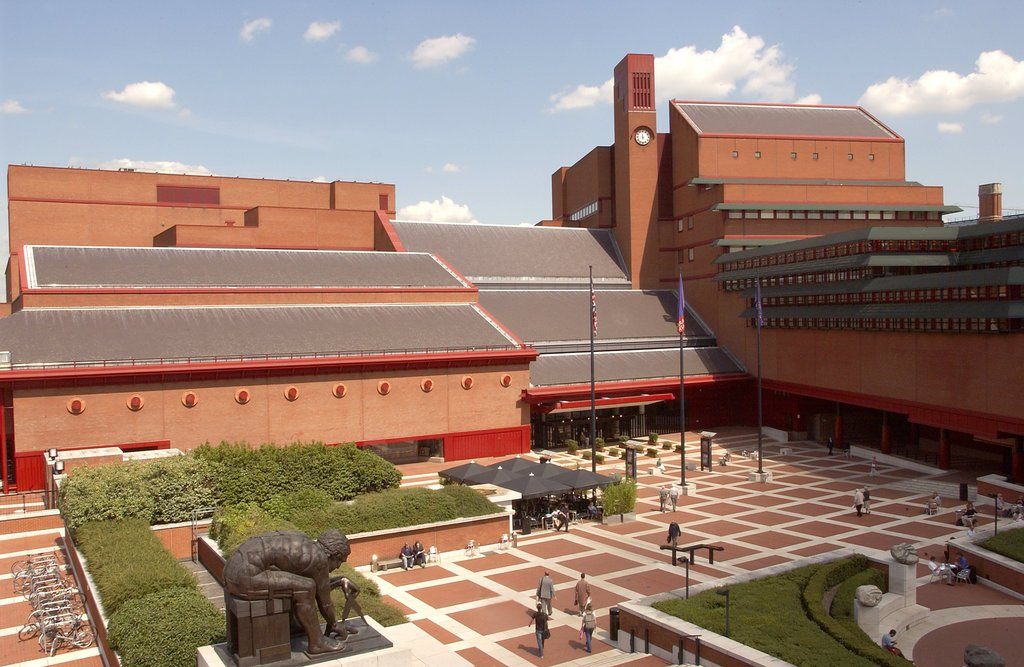
English PEN hosted an opening reception at the British Library for PEN International’s replacement Assembly of Delegates, November 2001
Finally, in August given the political situation in Macedonia, which was close to civil war, PEN’s Executive Committee “against the advice of the International Secretary” but “united in trying to overcome the situation,” decided to cancel the Macedonian Congress. Instead PEN planned a three-day replacement Assembly of Delegates in London where the business of PEN and its committees would take place but without all the literary and social events that usually accompanied a Congress. Delegates who arrived early could attend English PEN’s Day of the Imprisoned Writer service at St. Brides on Fleet Street, and English PEN hosted an opening reception and literary evening at the British Library; another reception at Lancaster House was hastily arranged, hosted by the Parliamentary Undersecretary of State for Foreign and Commonwealth Affairs. Ten years earlier a similar replacement Assembly had taken place in Paris when the Congress had been canceled in Delphi because of finances and the start of the Balkan War. (PEN Journey 7)
In September, “alarmed by the escalating volatility of the situation,” International Secretary Terry Carlbom sent a letter to PEN’s Vice Presidents announcing the change and asking for support. That letter was dated September 11, 2001.

November 2001 near Ground Zero in New York City after the 9/11 attacks. People remembering those lost and workers still clearing wreckage.
On September 11, I was in New York City. I had just flown in the night before from an International Crisis Group board meeting in Brussels to attend meetings at Human Rights Watch. That morning I was dressing and watching the news when, like millions of Americans, I saw the first plane fly into the World Trade Center. I assumed it was a terrible accident when suddenly live on tv I saw the second plane crash into the South Tower….
Phone lines quickly jammed. I couldn’t imagine my meetings would take place, but when I couldn’t get through, I left the hotel and began walking down Fifth Avenue towards the Empire State Building where Human Rights Watch had its offices. But as I headed downtown, the streets filled with people rushing uptown. New York City was closing, with no traffic allowed in or out. I found myself locked down in Manhattan. Most Americans can tell you where they were that day and what happened next.
Two months later I flew back to Europe for the PEN Assembly of Delegates, held in Russell Square in Bloomsbury at a cost-efficient hotel, rather stark if I recall, but functional and accommodating to the over 160 people who made their way from 65 PEN Centers around the world, delegates from every continent.
It was PEN’s 80th Anniversary. The initial meeting of PEN in 1921 with its first president John Galsworthy, PEN founder Catherine Amy Dawson Scott and others had been held in Bedford Square, not far from where we were meeting. PEN clubs had rapidly sprung up in Europe—in France, Sweden and elsewhere—and in the United States. By the Assembly in 2001 PEN had more than12,000 members in 131 centers in over 100 countries.
PEN was born in the upheavals of world history, observed International PEN President Homero Aridjis at the opening of the 2001 Assembly. “What should be the role of writers and PEN in the aftermath of 9/11?” he asked and answered that PEN should continue to ensure the role of writers and be alert to those who would try to sacrifice personal freedom and the rights of minority populations. It was important that democratic practices survive and that PEN remain vigorous in the defense of freedom.
In a resolution passed by the Assembly of Delegates, PEN recognized “the urgent threat to freedom represented by the terrorist attacks of September 11. It also recognized the aims of terrorism are incompatible with democratic values, including freedom of expression.” But the resolution also addressed the concern that “the emergency measures adopted by governments to combat ‘terrorism’ should not further endanger those values and the essential human rights that derive from them.” In the resolution passed, PEN “expressed its concern that legislation and executive orders currently being planned or already passed by the governments of the United Kingdom, the United States, Canada, Denmark, Japan and other countries may place unacceptable restrictions on these rights. PEN voices its concern that such measures may curtail existing rights of writers and journalists, as protected by Article 19 of the Universal Declaration of Human Rights and other international human rights instruments. The Assembly of Delegates of International PEN urges that the atrocities of September 11 should not be exploited by governments to assume extraordinary and unjustifiable power to curtail free expression.”
The Resolution on post-September 11 events was the first of more than a dozen resolutions passed by the Assembly, resolutions which included protests, actions and appeals regarding freedom of expression and human rights in Bangladesh, China, Cuba, Eritrea, Iran, Israel and Palestine, Mexico, Russia, Syria, Turkey, Uzbekistan, Vietnam, Zimbabwe, and relating to the Kurds.
The Russian delegate thanked PEN for holding the previous Congress in Moscow. “You saw with your eyes what was in Moscow. I want to thank you that you didn’t leave us in this difficult time,” he said. Russian journalist Anna Politkovskaya, who had been covering the war in Chechnya, then addressed the Assembly. She explained that she went to Chechnya in 1999 as a reporter for the only free and independent newspaper still publishing “to witness the crimes and evil by the Russian Army.” Because of recent threats against her by the government, she was advised by her editor to leave Russia, and she now lived in Vienna. “I’m going to remind you of unpleasant things the world has forgotten,” she said. “There is a war in Chechnya. The world doesn’t want to fight against this war. Nobody is counting how many civilians have been killed in the war. Journalists who cover the Chechen war have different figures from 18,000-100,000 people. There is no economy, only a black economy. Now there are practically no journalists who cover it…To me it’s clear it’s an anti-terrorist operation that failed to accomplish its goal, but against this background Putin has become a very important person after September 11…I want to remind you that all new wars are sequels to previous wars.”
After Anna addressed the Assembly, the delegates returned to the ongoing business of reports and resolutions, and Anna met with Writers in Prison Committee members and the WiPC Program Director Sara Whyatt.
Additional resolutions were also passed which approved the adoption of “the Membership Platform Document as a Working Paper of International PEN and as a guideline document governing the creation, organization and work of all PEN Centers.” The document developed in consultation with the centers and the Executive Committee and International Secretary, along with changes in Regulations and Rules of Procedure were part of the ongoing modernization of the organization. At the Assembly, the Executive Committee of PEN was officially renamed the Board of International PEN with an understanding that the translation of the term “Board” still had to be agreed upon by the French and Spanish speaking centers.
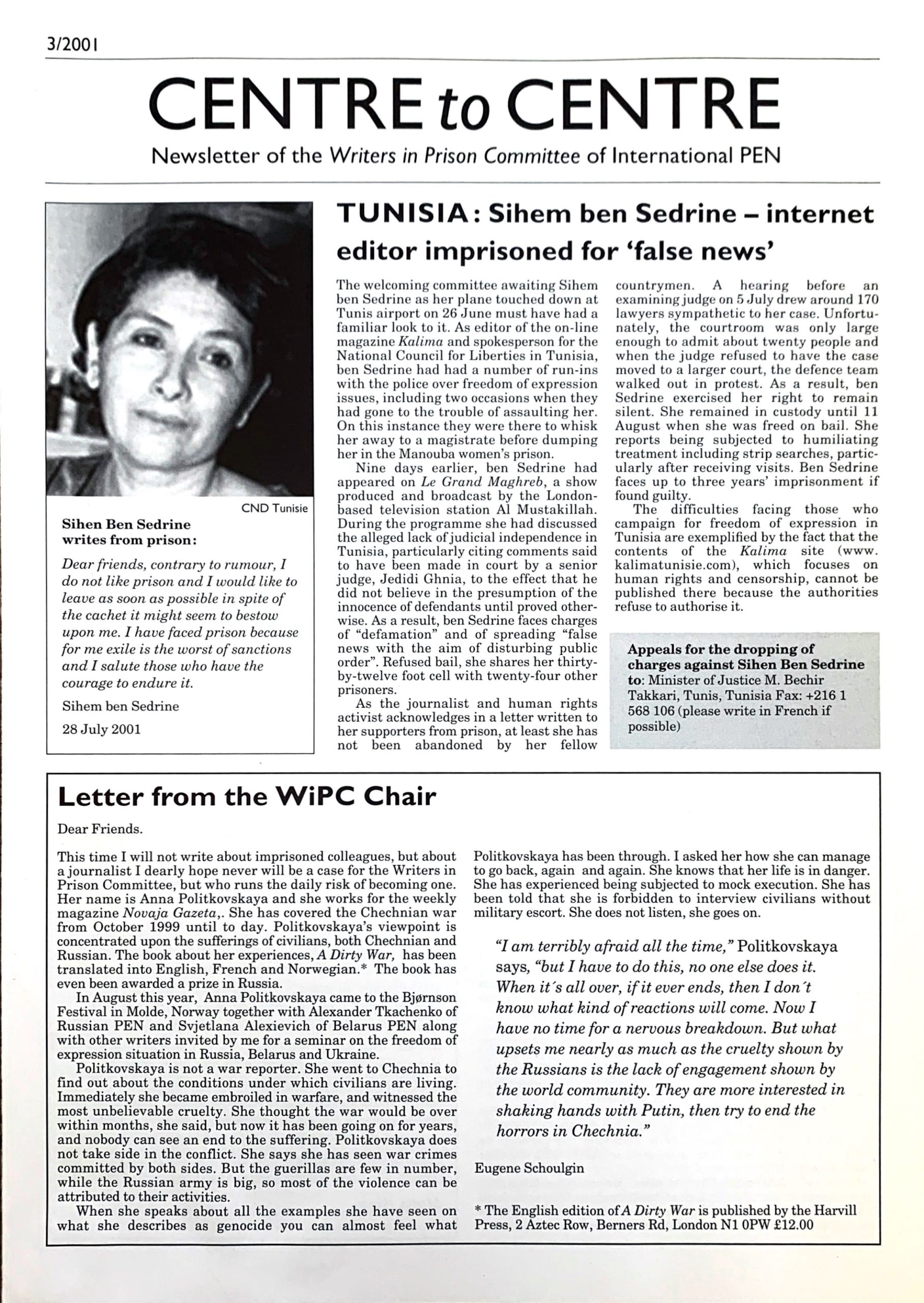
PEN’s Writers in Prison Committee newsletter summer/fall, 2001. The two stories—of Tunisia’s Sihem ben Sedrine and of Russia’s Anna Politkovskaya—would play out on a world stage a few years later.
In a globe where security paradigms had been turned upside down and armies were standing up, PEN’s 2001 Assembly, which had no remit in the area of security except to write about it, focused on the situation of writers around the world. This included the large number of prominent writers who had been freed over the past year after intensive PEN involvement as well as the rise in the number of writers who had been detained.
PEN worked in civil society. At the 2001 Assembly PEN encouraged regional cooperation between centers through networks. Earlier that year a trip through Africa by the International Secretary and African Board member Vincent Magombe had promoted further activity and growth of PEN centers in Africa.
The Assembly also attended to rules and regulations and the development of a strategic plan in the belief that a robust organization could better deliver the programs of International PEN and serve the world’s writers.
Elections gave Terry Carlbom a second term as International Secretary; Britta Junge Pedersen was elected Treasurer; Andrei Bitov and Moris Farhi were elected Vice Presidents, and with thanks to the three retiring Executive Committee members, especially Deputy Vice Chair Marian Botsford Fraser, three new members were elected to PEN’s International Board: Eric Lax (PEN USA West), Judith Roriguez (Melbourne PEN) and Alexander Tkachenko (Russian PEN.) Four new Centers were also voted into PEN: Algerian Center, Independent Chinese Writers Center, Nigerian Center and Ugandan Center.
PEN’s role at that time was perhaps best summed up earlier that year in an address by former International PEN President Arthur Miller at an American PEN event. He said, “That PEN is still around after three quarters of a century when it has no army, no navy or air force, no political rewards or threats of punishment, is possibly a triumph of illusion over reality, the illusion that hope is rational in this world.”
Next Installment: PEN Journey 26: Macedonia—Old and New Millennium
PEN Journey 24: Moscow—Face Off/Face Down: Blinis and Bombs—Welcome to the 21st Century
PEN International celebrates its Centenary in 2021. I’ve been active in PEN for more than 30 years in various positions and now as an International Vice President Emeritus. With memories stirring and file drawers of documents and correspondence bulging, I am a bit of a walking archive and have been asked by PEN International to write down memories. I hope this personal PEN journey will be of interest.
“Contrary to our tradition, this year’s PEN Congress is being held in a country in which a massive, genocidal military and paramilitary operation is under way. Besides mass murder, the crimes perpetrated against the civil population of Chechnya include deportation, rape, torture, destruction and theft of personal property as well as the systematic looting and destruction of the material bases of Chechnyan culture and civilization. At the same time, freedom of information has been severely curtailed, and the official propaganda plays on xenophobic and even racist ethnic stereotypes…” So began a Declaration from the 67th World Congress of International PEN voted by the Assembly of Delegates in May, 2000.
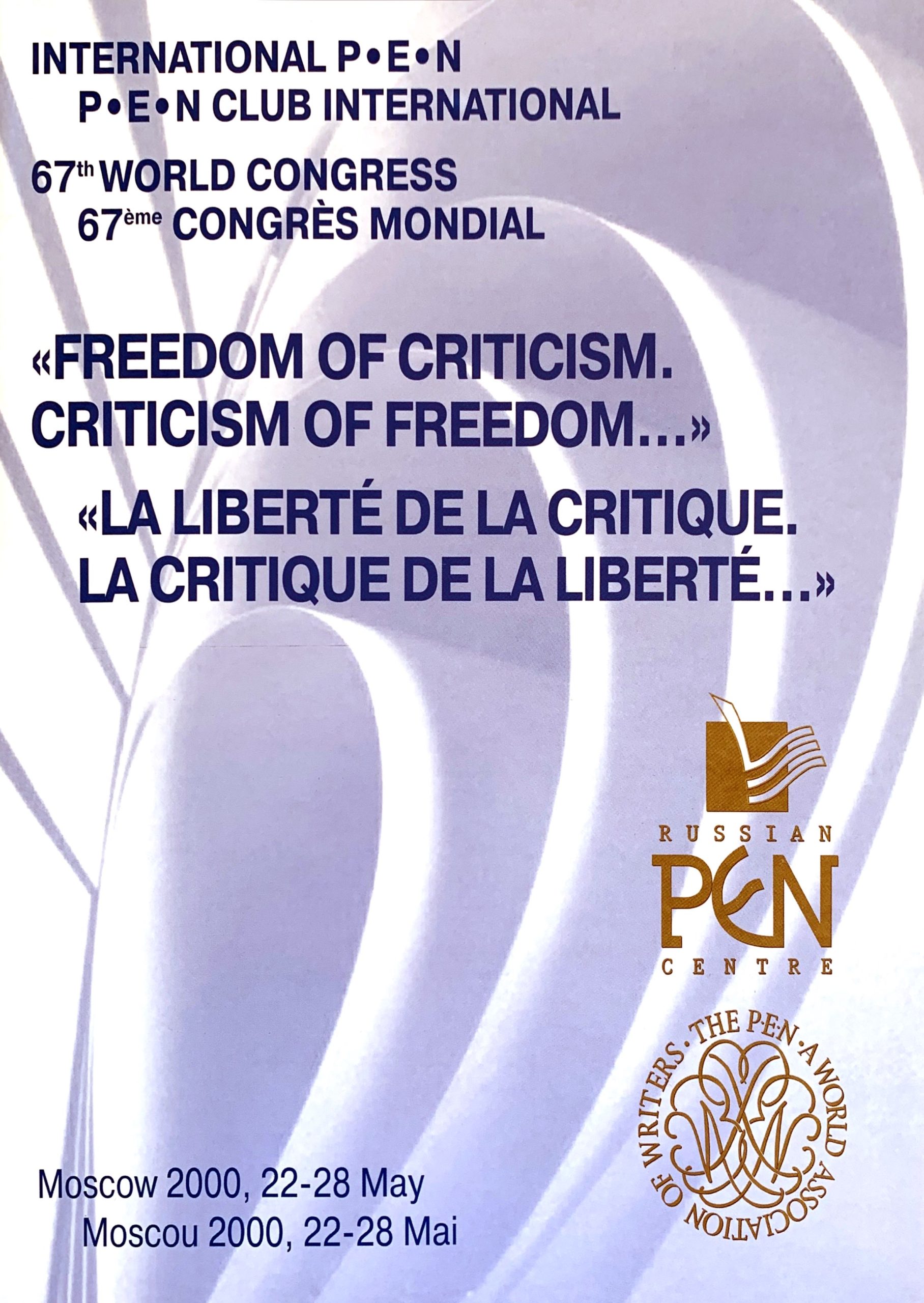
Program for PEN International 67th World Congress, Moscow
The decision to hold the International PEN Congress in Moscow was a controversial one, resulting in some members refusing to attend because of Russia’s prosecution of the war in Chechnya and the concern that holding a Congress in Moscow would give the government an appearance of approval. However, PEN’s Secretariat with the new Executive Committee concluded that the long-planned millennial Congress also presented the opportunity for International PEN to show solidarity with Russian PEN which had been outspoken both on the war and on behalf of Russian journalists and writers under pressure.
“The writers of Russia, united under the auspices of the Russian Centre of the International PEN Club, are concerned about the escalation of the war in Chechnya which is becoming a threat to not only peaceful residents of Grozny-city but also to the national security of Russia. The ultimatum announced to women, children and old people of the Chechen capital makes them hostages of both terrorists and federal forces. It is hard to believe that in this situation the Russian authorities are going to use the same methods as terrorists. We are very aware how hard it is to cut the tight Chechen knot, but in any case innocent people do not have to become victims of the decisions taken…” Russian PEN sent this appeal earlier to the acting President of the Russian Federation, Vladimir Putin.
Russian PEN members, including President Andrei Bitov, had signed the appeal. Russian PEN’s General Secretary Alexander (Sascha) Tkachenko noted at the Congress that it was essential to call on all those involved—Russian and Chechen—to cease their brutalities. Sascha himself had regularly stood up to the Russian government. He championed the cases of imprisoned writers Alexandr Nikitin and Grigory Pasko, both of whom had recently been freed after trials. Pasko, who was a journalist and former Russian Naval officer, had been arrested and accused of espionage for his publication of environmental problems in the Sea of Japan. Nikitin, a Naval officer, had been charged with stealing state secrets by contributing to a report that revealed the sinking of Russian nuclear submarines and the dangers these decaying submarines posed to the environment.
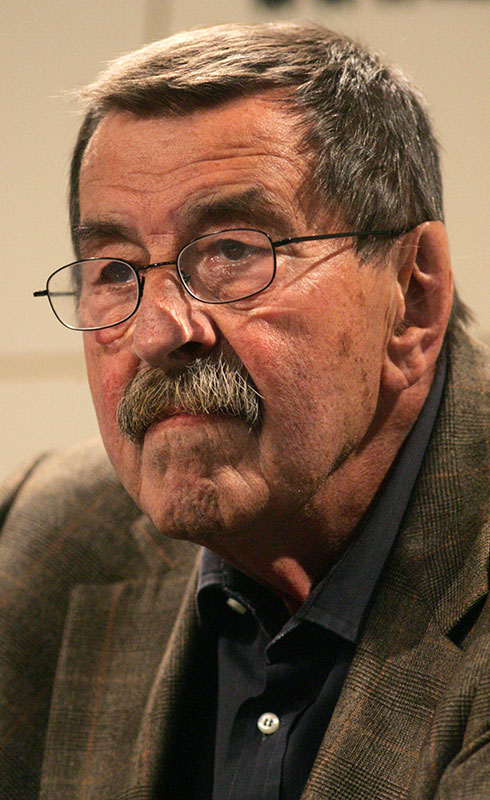
German novelist Günter Grass talk opened PEN’s 67th Congress
The freedom and the openings which many embraced after the break-up of the Soviet Union in the early 1990’s were beginning to close down and restrictions tighten. At the Moscow Congress Pasko expressed his gratitude for everything PEN had done to obtain his freedom. He urged the Assembly to focus on environmental problems. But he warned that the structure of the current Russian government had grown out of the KGB, and he feared nothing good would come for free speech or the environment.
In the opening address of the Congress German novelist Günter Grass, who won the Nobel Prize for Literature the previous year, recounted the many times in the past century that writers had called attention to the abuses and genocides which governments had tried to hide. “At least literature does achieve this—it does not turn a blind eye; it does not forget; it does break the silence,” Grass concluded.
The Congress theme “Freedom of Criticism. Criticism of Freedom…”seemed a particularly UNESCO title, with a focus on how freedom is exercised, noting that freedom unrestrained by morality can lead to a license for corruption, brigandage, state terrorism, censorship and the wanton murder of those who dare to speak out. “That freedom is a double-edged sword is a fact long appreciated in free societies. It is what prompted Voltaire to place a limitation upon it, when it interfered with the freedom of another,” one Congress description noted.
Thus framed, the panels and the work of PEN’s committees proceeded. Many wondered how able PEN members would be to criticize openly as we met both formally and in cafes sharing conversation and meals of blinis and caviar. There was no incident nor interference that I recall at the Moscow Congress nor at the subsequent programs in St. Petersburg, but we were all aware that repercussions could follow after we left. Over time Putin’s government did close down the space for NGO’s with Russian PEN as one of the early targets. (Future blog post.)
The Moscow Congress itself proved an opportunity to celebrate Russian literature and other literature as well as to conduct the work of PEN’s committees which met in halls named after Tolstoy, Pushkin, and Chekov. Many writers from over 70 PEN centers were visiting Moscow for the first time since the Soviet Union broke apart. Since my first trip in 1991 shortly after the coup attempt (PEN Journey 8), the city had changed. Western hotels, restaurants and stores had moved in; certain citizens had amassed wealth; others had lost jobs and security. It was a city of contrasts with children on the street begging, but begging by playing violins. A wealthy new group crowded the lobbies of western hotels and department stores.
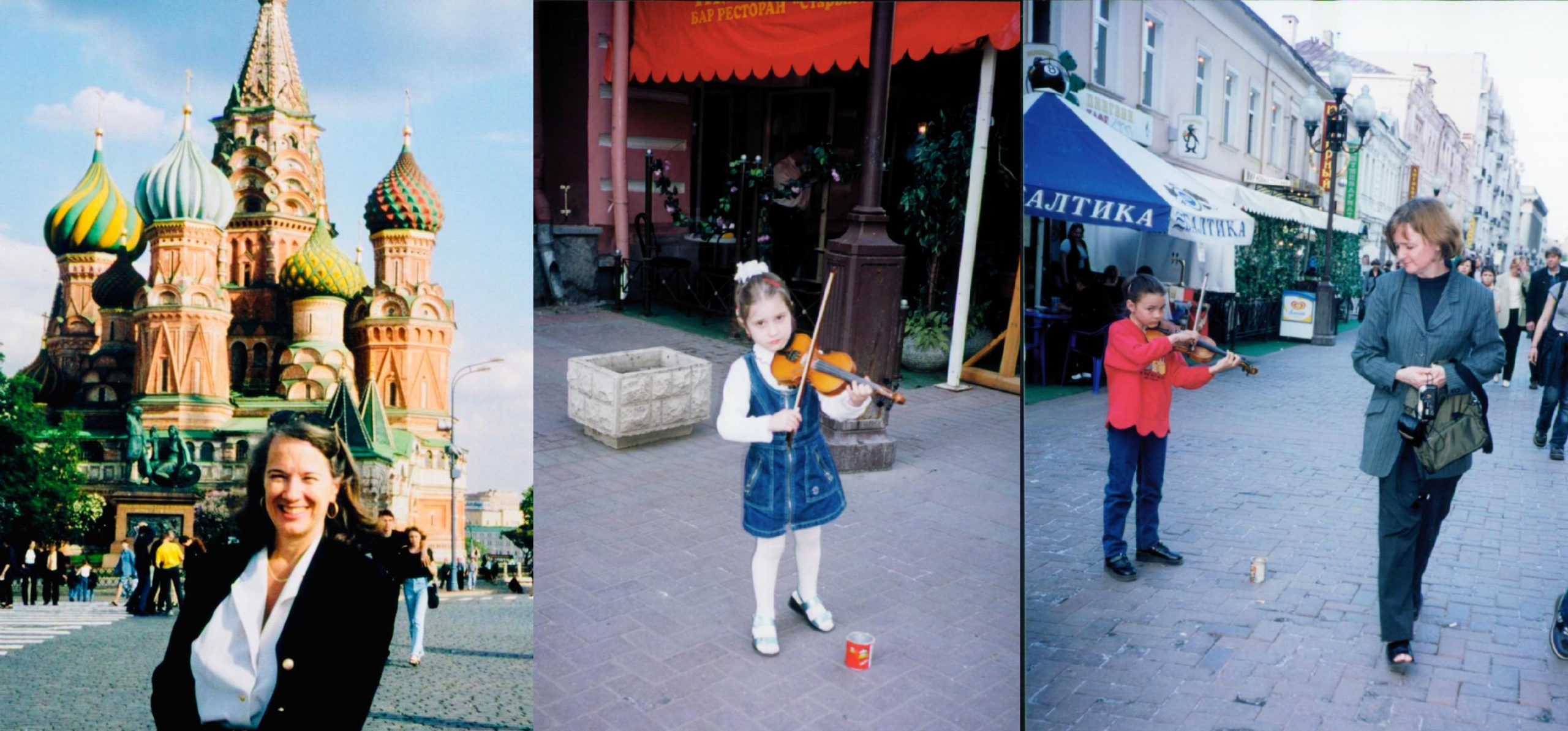
On the streets at PEN Congress in Moscow May, 2000: L: Joanne Leedom-Ackerman, PEN Vice President; R: Sara Whyatt, PEN Writers in Prison Committee Program Director
In a message to the Congress Andrei Bitov wrote:
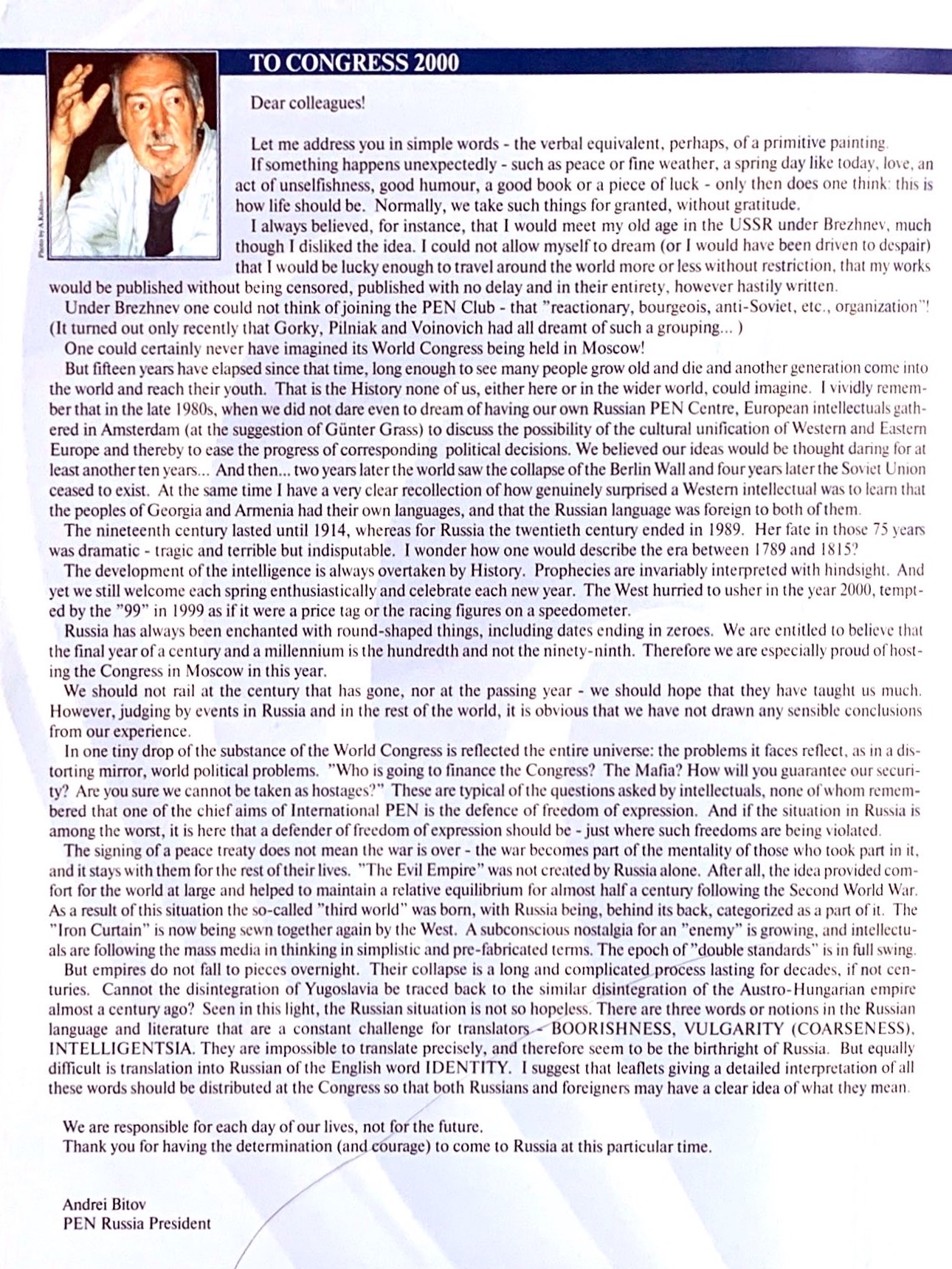
Full text of Russian PEN President Andrei Bitov’s message to PEN delegates
I always believed…that I would meet my old age in the USSR under Brezhnev, much though I disliked the idea. I could not allow myself to dream (or I would have been driven to despair) that I would be lucky enough to travel around the world more or less without restriction, that my works would be published without being censored, published with no delay and in their entirety, however hastily written.
Under Brezhnev one could not think of joining the PEN Club—that “reactionary bourgeois, anti-Soviet, etc., organization”! (It turned out only recently that Gorky, Pilniak and Voinovich had all dreamt of such a grouping…)
One could certainly never have imagined its World Congress being held in Moscow!
But fifteen years have elapsed since that time, long enough to see many people grow old and die and another generation come into the world and reach their youth. That is the History none of us, either here or in the wider world, could imagine…
We should not rail at the century that has gone, nor at the passing year—we should hope that they have taught us much. However, judging by events in Russia and in the rest of the world, it is obvious that we have not drawn any sensible conclusions from our experience…
In one tiny drop of the substance of the World Congress is reflected the entire universe, the problems it faces reflect, as in a distorting mirror, world political problems…
We are responsible for each day of our lives, not for the future.
Thank you for having the determination (and courage) to come to Russia at this particular time.
PEN’s business at the Assembly of Delegates included the International Secretary Terry Carlbom’s report on PEN’s relationship with UNESCO as the only global organization representing literature associated with UNESCO and a preliminary notice about a multi-year strategic plan under development. Business also included the election of the International President. Homero Aridjis was standing for a second term, and former International Secretary Alexander Blokh of Russian origin had returned to this PEN Congress for the first time since he’d stepped down as International Secretary in 1998, (PEN Journey 20) and he was also running for President. I was asked to chair the Assembly for the election, including during a stir that arose when Alex wasn’t present to speak for his candidature. He’d left the meeting early for an appointment, mistakenly thinking he would speak in the afternoon. However, there was no afternoon session, and controversy arose over whether the election should be postponed so he could speak. I ruled that he would be the first item on the morning agenda and then the election would proceed as scheduled. Homero Aridjis won a second term; Alexander Blokh continued to serve PEN for many years as a Vice President and President of French PEN.
Also at the Congress Martha Cerda (Guadalajara Center) succeeded Lucina Kathmann as Chair of the Women Writers’ Committee; Veno Taufer (Slovene PEN) succeeded Boris Novak, who’d opposed holding the Congress in Moscow and had stepped down as chair of the Writers for Peace Committee, and Eugene Schoulgin (Swedish PEN) was confirmed as the new Writers in Prison Committee Chair.
In his farewell comments as WiPC chair Moris Farhi quoted Günter Grass’s address that literature always breaks the silence. Moris added that by breaking the silence, by telling the truth and exposing wrong-doing, literature also defied fear and embraced courage. The members of International PEN had witnessed this defiance of fear and the manifestation of courage time and again. Moris noted among those with courage were Grigory Pasko, Alexander Tkachenko and our colleague Boris Novak.
The Moscow Congress saw the return of delegates from Chinese PEN after a decade-long absence post Tiananmen Square. Two resolutions on China were presented, one calling for the release of dissident writers imprisoned in China and another protesting the long prison terms for writers in Tibet. The Chinese delegate objected to both resolutions, arguing first that Tibet shouldn’t be singled out as though it were not part of China. He also said that the Chinese people and Chinese writers cared for human rights after centuries of feudal society, but the West emphasized individual rights and values while the Chinese valued collective human rights and obligations to the family and society. The Chinese believed that human rights in a given country were related to the social system, the level of economic development and historical and cultural traditions of that country, and they encompassed the right to development and subsistence. A country of more than 1.2 billion people had to find food and clothing. It was impossible for one pattern to solve all existing problems. The Cold War had ended, but its influence remained with those who believed their values, their concept of human rights, their position were the only correct ones in the world. Dialogue was the only way to resolve the differences of view, a dialogue based on equality and mutual respect.
Hands shot up seeking to respond. At least 25 delegates at the Assembly spoke, welcoming the return of the Chinese delegates to the PEN Congress, but most taking exception to the argument of the relativity of human rights in PEN’s work. The first to speak was Eric Lax of PEN Center USA West who said he appreciated the speaker’s comments but wanted to add that the PEN Charter, to which all members subscribed, was very clear that freedom to write was a basic tenant of the organization and that information should pass unimpeded without restriction. Some questioned the way the resolution was written. Alexander Tkachenko of Russian PEN said he felt PEN should be understanding of people living under a regime about which the rest of PEN knew little. It was up to the Assembly to decide whether to support the resolution; they needn’t accept the Chinese delegate’s opinion, but they should respect it. He didn’t want the Chinese to be missing from PEN for another ten years. PEN should be tolerant of those for whom it was extremely dangerous to discuss such questions. The Assembly applauded. A small amendment was made to the resolutions, both of which passed with large majorities, though not unanimously.
The following year the Independent Chinese PEN Center (ICPC) came into being, a center of independent writers and democracy activists inside and outside of China. One of the founding members and the second president of ICPC (2003-2007) was writer Liu Xiaobo, on whose behalf PEN worked twice when he was imprisoned after Tiananmen Square and again when he was arrested in 2009. Liu Xiaobo was the first Chinese citizen to win the Nobel Prize for Peace in 2010, but he was incarcerated in a Chinese jail, and he died in custody in 2017.
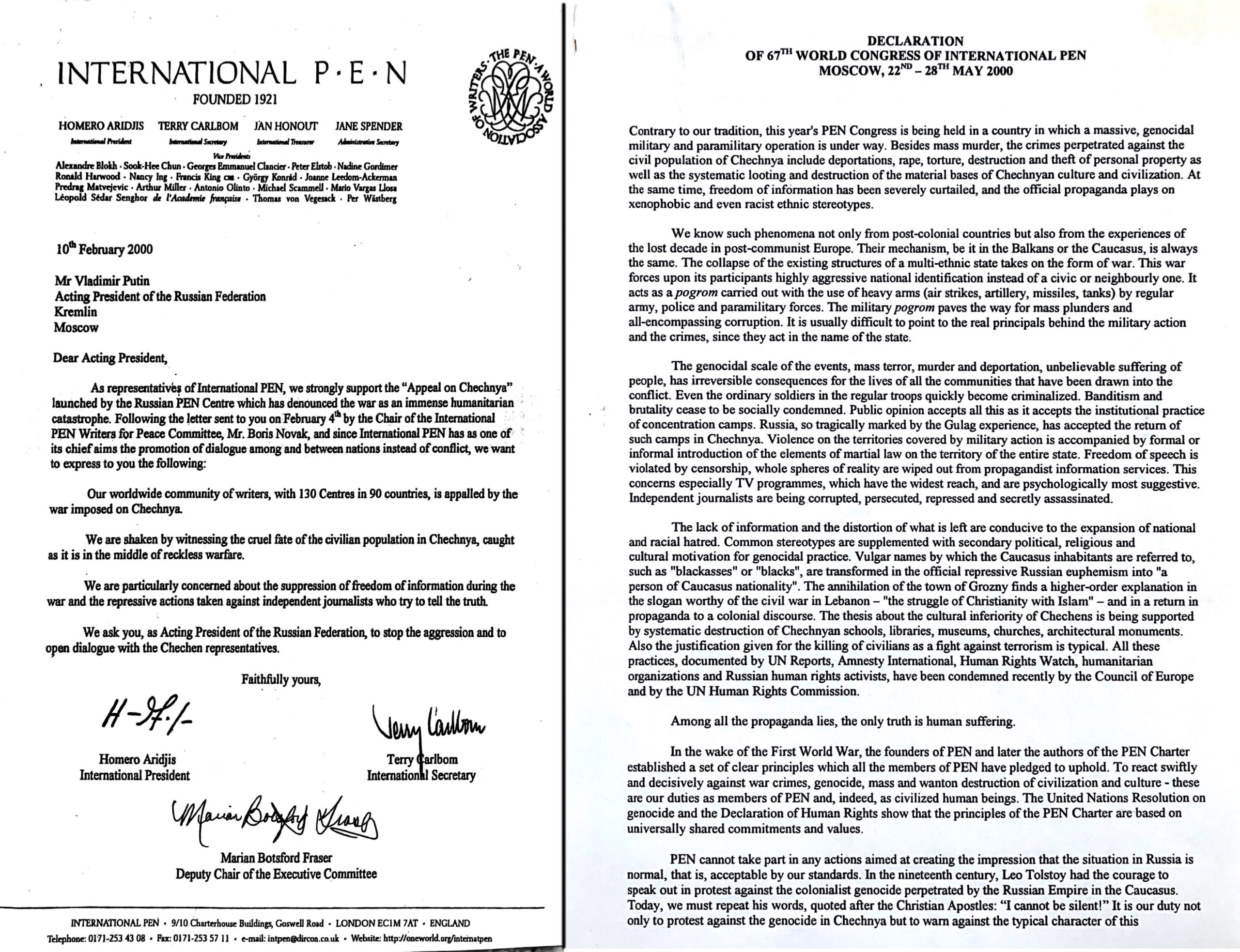
Next Installment: PEN Journey 25: War and more War: Retreat to London